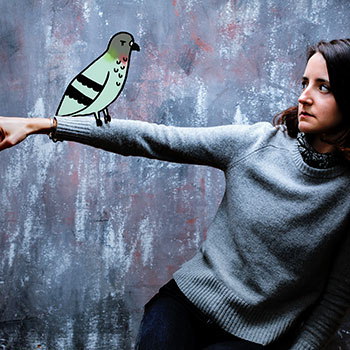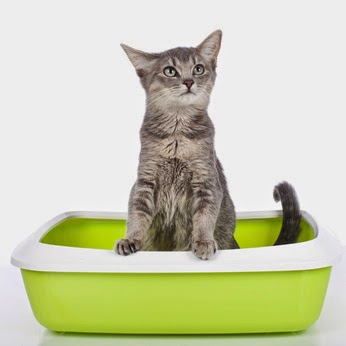Unsavory Facts of Animal Life
Brooke Barker, Sad Animal Facts
 Brooke Barker's book, Sad Animal Facts, contains Animal Kingdom's more unfortunate truths, with over 150 of her own hand-drawn illustrations. Brooke states that if you have to deliver sad news about animals, the best way to do it is with a cartoon that's not too sad but a little bit cute.
Brooke Barker's book, Sad Animal Facts, contains Animal Kingdom's more unfortunate truths, with over 150 of her own hand-drawn illustrations. Brooke states that if you have to deliver sad news about animals, the best way to do it is with a cartoon that's not too sad but a little bit cute.
However, while some of the facts in her book are sad, there are others that are just plain funny! Brooke has always thought that animals are amazing and they can do things that humans can't do, and its fun to think about these things with a slight twist.
Some of Brook's favorites facts are that zebras can't sleep alone. They like to sleep in groups so one can always be on the lookout for danger. So all of the times that Brooke has been sad to sleep alone herself, it is comforting to know that a zebra feels the same way!
Another amazing fact is that giraffes also need only about 2 hours of sleep each night. Therefore, any time that one of Brooke's friends says that they are tired, she tells them if they slept more than two hours, then they have slept more than a giraffe.
What about green polar bears? Turns out that polar bears' hair is like small tubes and if they get algae in there, they turn green. There is no way that they can clean this off, because it is on the inside. So don't be surprised if you ever see a green polar bear.
 This next fact is really strange. Did you know that turtles breath out of their butts? Brooke states that this is a good skill! She thinks it must be useful for being underwater. It is a way to move air from their lungs back and forth from their butt as well as from their mouths. She asks if Dr. Debbie has a more scientific word for it - to which Dr. Debbie replied, "Sounds a lot like passing gas!"
This next fact is really strange. Did you know that turtles breath out of their butts? Brooke states that this is a good skill! She thinks it must be useful for being underwater. It is a way to move air from their lungs back and forth from their butt as well as from their mouths. She asks if Dr. Debbie has a more scientific word for it - to which Dr. Debbie replied, "Sounds a lot like passing gas!"
Speaking off passing gas, did you know that herring also pass gas as a way to communicate? They pass it in different bursts and different lengths as a way to communicate with each other under water.
One true sad fact is that if a female ferret goes into heat and doesn't mate, she will die. This is because they can develop a fatal anemia from continually being in heat. However, you can solve this problem by just spaying them.
Can you imagine not being able to taste anything sweet? Well, that is the fate of the cat. They don't have the sweet receptors on the tongues to taste sweet. So - stop sharing your ice cream with them!
You will find these and many more fascinating facts about animals in Brook's book, Sad Animal Facts.
Brooke Barker is a writer, illustrator and animal enthusiast living in Portland, Oregon. She has a dog that can never eat chocolate and three guppies that can't take naps because they don't have eyelids.
Visit Website
 A Place To Retire With Your Pets
A Place To Retire With Your Pets
Watermark Retirement Communities
Founded by pet lovers, Watermark Retirement Communities welcomes pets in many communities coast to coast. In fact, pets are encouraged. While many residents live with their own four legged friends, visiting pets also make regular appearances, sometimes accompanying associates on their workday. Interactions between these loving animals and the humans that love them back are a perennial source of comfort and healing.
We spoke with two residents of Watermark Retirement Communities, Betty Sanders and Joseph Leigh. Betty didn't have her own pet, her pet actually belongedd to the resident care director. However, the dog stayed with Ms. Sanders all day long, so it felt like her own pet. Joseph was fortunate enough to have his own dog, which rode around his scooter with him throughout the community.
Betty Sanders called her dog, "Dr. Mocha," because she was like a doctor to her. Dr. Mocha came to her door daily and cried and barked for someone to open the door and let her in. While Mocha belonged to the supervisor, she fell in love with Betty and Betty loved her. Dr. Mocha seemed to seek out the sick people. When Betty first arrived, she was depressed. Betty stated that she didn't meet Dr. Mocha, Dr. Mocha met her! Dr. Mocha made sure that she visited Betty often.
Dr. Mocha jumped in bed with her and stared her in the eyes, making sure she was okay and cheered Betty up. Sometimes they walked around the facility together, with Dr. Mocha ignoring everyone else but Betty. They even rode the elevator together.
 They had a great relationship, but sometimes Dr. Mocha wanted Betty to share her food. Betty just told her that, "That's rude! I don't beg you for your food, don't you beg me for mine!" and then told her to go to her chair. When Dr. Mocha got in the chair, Betty told her to put her head down so she couldn't watch her while she was eating. Dr. Mocha always complied.
They had a great relationship, but sometimes Dr. Mocha wanted Betty to share her food. Betty just told her that, "That's rude! I don't beg you for your food, don't you beg me for mine!" and then told her to go to her chair. When Dr. Mocha got in the chair, Betty told her to put her head down so she couldn't watch her while she was eating. Dr. Mocha always complied.
Betty is not sure what kind of dog she was, as she was a mix. However, she was so little she still looked like a puppy. Betty states she always had a dog until she got sick. Dr. Mocha had made things so much better for her and is better trained than some children Betty knew!
Joseph Leigh lived in a community where five residents there had small dogs, all under 15 pounds. Joseph decided to live in this community because they allowed him to keep his dog. His dog, Miss Marty, was a blonde poodle and they rode around all day together on his scooter.
Watermark Retirement Communities is a company committed to creating extraordinary communities where people thrive.
Visit Website
How To Build The Perfect Litter Box - Dr. Debbie
 One sniff upon entering your home and you recognize the unmistakable odor of cat urine and feces. Simba has used your entry hall as his litter box again. But before you lose your temper - stop. By scrutinizing the environment through your cat's eyes, you will likely discover the cause of his toileting mishaps.
One sniff upon entering your home and you recognize the unmistakable odor of cat urine and feces. Simba has used your entry hall as his litter box again. But before you lose your temper - stop. By scrutinizing the environment through your cat's eyes, you will likely discover the cause of his toileting mishaps.
Elimination issues are a main reason for veterinary visits and a primary reason for relinquishment of cats at shelters. House soiling problems can be multi-factorial, with an overlap of behavioral, environmental and medical causes. Feline house soiling can be managed, however, with sleuth work and patience. The challenge is to think like a cat.
First and foremost, say this and repeat it…"My cat does not eliminate out of the litter box to get even with me." Cats do use urine and fecal scent marks to communicate territory, but this isn't done with spite or in effort to "get even" with you. Inappropriate elimination is a cat's way stating that something isn't right in their world. Understanding this is key before tackling feline house soiling. Focus on what's wrong in Simba's toilet area, not on how the house soiling makes you feel.
Start With a Vet Check
Cat owners often struggle with house soiling mishaps for months or years before enlisting help from their veterinarian. But, seeing the veterinarian should be the first step, since health disorders may be at the root of some house soiling issues. Your efforts in restoring litter box usage will be doomed if an underlying medical cause is not addressed at the same time.
Size Does Matter
Make sure your cat's litter box is of adequate size to allow maneuvering. Litter box size should be one and one half times the length of cat's body length. Height of the edge also matters. For older kitties, try lower profile litter boxes or plastic under bed storage boxes. An arthritic older cat won't complain or cry in pain with arthritis, she'll just chose to eliminate elsewhere.
Consider the View
Cats don't want to be startled while in the loo. Don't place the litter box in a high traffic area where people and pets are always coming and going. Cats prefer a low traffic area where they can have an eye out on things.
Don't place the litter box near appliances which give off noise, vibration and heat, all which disturb your cat while eliminating. Once a negative aversion is created, your cat may not return to use that box in the future.
Ditch the Litter Box Cover
While some nervous kitties prefer the privacy of litter box covers, the majority of cats dislike the tight quarters and limited ventilation litter box covers provide. Consider how you feel in a public porta-potty. Do you like to touch the walls when inside? Sure, people like the way the lid contains odors, but does it really matter how little odor comes from the litter box when your cat is pooping on your oriental rug?
Provide More Than One Box
A common error is assuming that one litter box is all your cat needs. What cat owner loves the litter box and relishes seeing more of them in the home? But the more the better when it comes to faithful litter box usage, especially with multiple cats. The general rule is to provide one more box than the number of cats. Some cats share litter boxes, others will not. Unless you provide alternate sites, you may have elimination issues in multiple cat homes.
 Another special consideration is differences in cat's personalities - timid cats may avoid crossing paths with other more assertive pets in home. Be sure to provide litter box sites that won't be blocked by other animal's movements.
Another special consideration is differences in cat's personalities - timid cats may avoid crossing paths with other more assertive pets in home. Be sure to provide litter box sites that won't be blocked by other animal's movements.
If you live in a multilevel home - you must provide litter box sites on each level. This is especially important in multi-cat homes, those with senior cats or those with health conditions.
The Pick of Litters
Litter texture preferences vary and there are many choices from scoopable, clay, crystals or natural litters. However, in one research study of cat's litter box habits, it demonstrated that the majority of cats prefer fine grained scoopable clay based litters that have carbon as their odor absorbing ingredient. Every cat is different though, so try other litter varieties until you find your cat's preference.
Skip the Scents
The verdict is still out on what odors cats prefer, but avoid heavily scented litters or deodorizers if your cat is missing the box. Interestingly enough, one study showed cats preferred cedar odors while avoiding citrus and floral scents, while another study concluded cats preferred bleach smells to other scents.
Kitty Litter Depth
Ideal litter depth is 2 inches - more isn't always better. Some cats thrive on scratching the bottom of the pan, which is obscured by excessive amounts of litter.
Keep It Clean
Cats are fastidious by nature and will avoid using a soiled or smelly box. The overall cleaning frequency depends on the number of cats in the home. General advice is to scoop twice a day and deep clean the litter pan weekly. Change out clumping litter every 2-3 weeks.
Build It and Kitty Will Use It
By building your cat's dream litter box, your cat will find litter box nirvana and you'll come to enjoy a better relationship with your kitty family members without those unwanted "presents" in the foyer.
Featured veterinarian known as "Dr. Debbie" on national pet radio program, Animal Radio. Ebook author of "Yorkshire Terriers: How to Be Your Dog's Best Friend"; "Pugs: How to Be Your Dog's Best Friend"; "Mini Schnauzers: How to Be Your Dog's Best Friend"; and "Shih Tzu: How to Be Your Dog's Best Friend." Dr. Debbie's books.
Visit Website
5 Must Know Things To Understand When Training Your Dog"
Robert Semrow, Animal Radio Listomania
It's Robert Semrow, your pet world insider here with this week's Animal Radio Listomania.
 Before you embark on training your favorite pooch, here a few friendly tips for training the untrained.
Before you embark on training your favorite pooch, here a few friendly tips for training the untrained.
#1 - Be patient and have realistic expectations. That's right, your dog may be the smartest being in your home, but that doesn't mean that they're going to understand everything you are trying to train them to do. So, have a plan and know that it is going to take some time to train and reinforce the behaviors, tricks and requests that you have in mind. Think of it this way, a dog is doing what comes natural to them, so whatever you are trying to change or correct is not necessarily natural for them, so it's going to take some time.
#2 - Be specific and use the proper terms at the moment it occurs. If Fido has chewed up your favorite slippers while you were away at work, coming hours 8 hours later and saying "No and bad dog" doesn't really tell them what they need to know to stop the behavior. For all they know, you arriving at home has somehow made them a bad dog. So, when you see them doing something that you need to correct, be specific, for instance, if they are jumping up on someone. No just tells them you don't want that but doesn't tell them what you do want them to do. So instead say, "Sit." That gives something that they understand and know what to do instead of jumping.
#3 - Consistent messaging from all they meet. If you are telling you're pooch "Off" when they jump on the bed and your housemate is saying "Down" it gets confusing for them. So everyone in the home needs to be consistent.
#4 - Training is more than the 1-hour you devote to it. Every interaction you have with your pet is training. Yes, you may specifically work on a trick or ask, but the reality is that you are in a constant state of training and reinforcement. So, training and learning never really stops. If you see a new behavior has developed, ask yourself what you or your housemates have done to teach this or reward this new behavior.
 #5 - You don't have to rely on food treats. Yes, who doesn't love bacon or cheese treats every time they do something right? It's my favorite way to learn too. However, it adds to the obesity problem. You are also sending the message that when you don't have food your dog may not need to do what you are wanting. Remember, most of the time your dog is only too eager to please not because you are a walking treat machine, but because you give them love, praise, affection and reinforcement. Go ahead and use treats, but mix in praise, belly rubs and other non-food related rewards as well.
#5 - You don't have to rely on food treats. Yes, who doesn't love bacon or cheese treats every time they do something right? It's my favorite way to learn too. However, it adds to the obesity problem. You are also sending the message that when you don't have food your dog may not need to do what you are wanting. Remember, most of the time your dog is only too eager to please not because you are a walking treat machine, but because you give them love, praise, affection and reinforcement. Go ahead and use treats, but mix in praise, belly rubs and other non-food related rewards as well.
Finally, remember that you may not be the best at training and from the dog's eye view, they've trained you. They stole your heart, trained you to feed them, care for them and pay attention to them, just by being themselves. To be the leader, you are going to need to use patience, planning and occasionally some prayers and even bacon. You know it's worth and we do too.
Good luck and share your training tips with us here at Animal Radio our Animal Radio Face Book Page.
Visit Website
Animal Radio News - Lori Brooks
 Proof That Cloned Animals Live Long & Normal Lives
Proof That Cloned Animals Live Long & Normal Lives
The heirs of Dolly the sheep made it to the old age of 9, putting a lot of fears to rest. Basically, they proved that cloned animals can live long and normal lives. If you don't remember, Dolly the sheep was the first animal cloned using a technique that did not use sperm back in 1996 in Scotland. Dolly died young, in 2003, when she was only six, after she develop osteoarthritis and a lung infection. That set off many fears that cloned animals may age more quickly than normal offspring. However, 10 cloned sheep, including four clones of Dolly that were born in 2007, reached the age of 9 years. They were then put down because they were approaching their 10th birthday, which is very old for a sheep, and there was no 'scientific merit' in keeping them alive. The four sheep were cloned using the same genetic material as for Dolly and were called Daisy, Debbie, Denise, and Dianna. However, unlike Dolly, who was housed indoors for security reasons, these clones mostly lived outside.
Wackiest Pet Names
The pet insurance division of Nationwide compiled a list of the 10 "wackiest" dog and cat names from their database of insured pets. After selecting the 10 finalists in their annual Wacky Pet Names competition, the company turned to the Internet, asking people to vote for the dog or cat with the wackiest name. The top entries include Kanye Westie, Butch Catsidy, Optimus Prime Rib, Lt. Colonel Be Back Soon, Agent Jack Meower and Angus Von Wigglebottom. Previous winning dog and cat names were Baron von Furrypants for a dog and Leonardo DiCatprio for a cat.
 Sanctuary Wants Rapper Tyga To Pay For Support for Tiger
Sanctuary Wants Rapper Tyga To Pay For Support for Tiger
Rapper Tyga had a pet tiger years ago, but it was taken from him when authorities found out that he had no legal permits for it. The tiger was then given to an animal sanctuary. The sanctuary, named Lions, Tigers & Bears, which took care of Tyga's former tiger, said the rapper did not made any effort to help out with funds to care for the animal. It costs over $10k a year to feed the tiger, not including vet costs and other expenses.
A Horse Wants You To Chose the Right Bra Before Riding Him
Women and girls who ride horses, but do not wear a sports bra, could be causing undue stress to the horse, according to a study by Porstmouth University. Apparently a lot of women give no regard to what kind of bra they wear while riding. They did a survey of females who ride horses in various disciplines and found that less than one in five regularly wore a sports bra for riding, even though it can lead to poor posture and musculoskeletal problems, which are sensed by the horse. A previous study showed that a horse's heart rate increases as a direct response to tension in the handler or rider. The study also found that 40-percent of the more than 1,300 riders surveyed said they had experienced chest pain while riding and the likelihood of pain increased with cup size and body mass. It's not at all surprising that this research revealed that breast pain was experienced most frequently during the sitting trot. Only 14-percent of small-breasted riders and 19-percent of large-breasted riders opted to exclusively wear a sports bra when they rode a horse. This compares to 82-percent of marathon runners who say they always wear a sports bra when taking part in moderate physical activity.
 Free Ambulance Service for Pets
Free Ambulance Service for Pets
Jon Nowinksi was the owner and driver of the first known pet ambulance in the state of Connecticut. He ran the service out of an SUV for a while, until he took over a retired human ambulance. He converted it to a treatment and transport vehicle just for animals. He was getting about a dozen calls each month for EARS, the Emergency Animal Response, which travelled all over the state. The really unbelievable part of it was they did NOT bill anyone for the service, because volunteers did everything!
 Chief Mousers Get in Scuffle
Chief Mousers Get in Scuffle
The job market for rescue cats expanded, at least in Great Britain. The British Treasury joined Downing Street and the Foreign Office in naming a rescue cat to the office of Chief Mouser. One cat to join their workforce was 18-month-old Gladstone. He joined longtime government employee Larry and fellow new addition Palmerston, in defending Britain's government offices from mice. Unfortunately, there had been a little drama going on with the mousers due to the strained relationship between Palmerston and Larry, who was sent to the vet in what may have been the result of a scuffle between the two incumbent mousers.
 Listen to the entire Podcast of this show (#1225)
Listen to the entire Podcast of this show (#1225)





